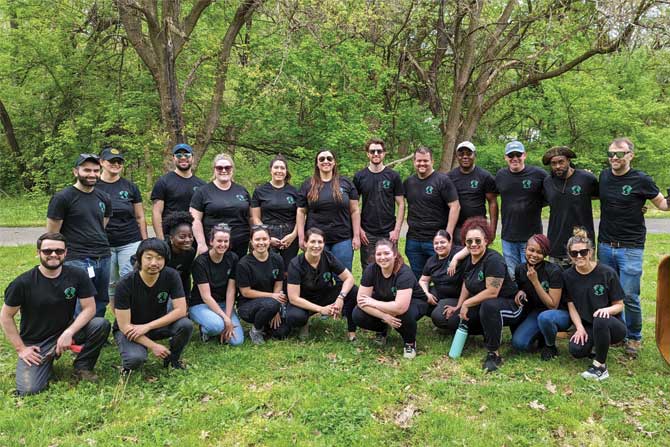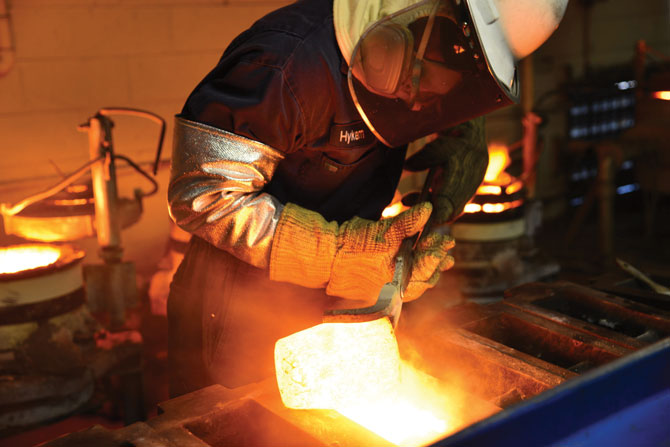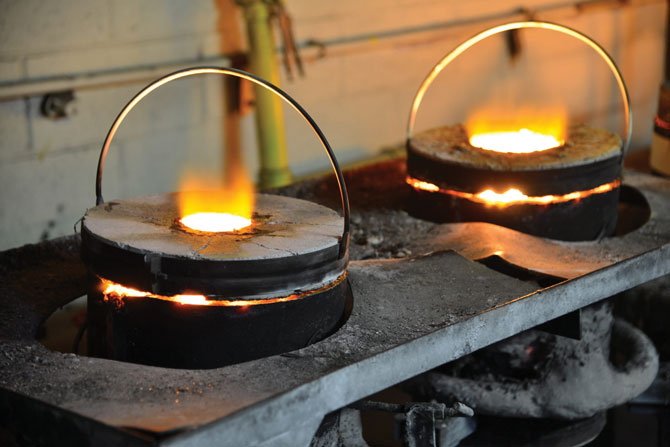Is your metal recycling program having enough impact on your business and community? Recycling programs with Garfield Refining are built to drive sustainability and social impact through operational efficiencies and targeted metal capture.
Best practices for recycling post-cremation metal are still evolving in the death care industry. Many crematories have questions about ethical recycling, local and state regulations, and evaluating recycling partners to find the best fit. Garfield works with crematories to build recycling programs that positively impact both business operations and
local communities.
Focusing on impact has been core to Garfield’s culture since it was founded in a small building in Center City Philadelphia, more than 130 years ago. Now operating a refinery with more than 12,000 square feet of state-of-the-art equipment, Garfield has a global reach and over one million clients. It’s come a long way from being the local refiner of choice for Philadelphia’s Jeweler’s Row and making silverware! The secret to Garfield’s sustained success is its commitment to its core values: sustainability, customer focus, and giving back to its community.
Developing a recycling program focused on impact starts with collection efforts at the crematory. To be truly sustainable, a recycling program should identify as much metal during processing as possible. Every ounce of metal recycled with Garfield is an ounce that does not have to be mined; instead, gold, silver, palladium, and platinum are repurposed through Garfield’s conflict-free and responsible supply chain. Garfield helps crematories focus on small metals, like gold and palladium, in dental material. Through training and equipment improvements, many crematories that start working with Garfield see three-to-four times as much metal captured and greatly enhance the impact of their recycling program.
Once a crematory has optimized collection, Garfield leverages its expertise to capture as much value from the recycled metal as possible. Value from the metal is then returned to crematory operations or funneled through Garfield’s direct donation program, through which crematories donate directly to charities or trade groups. For example, Garfield works with the Funeral Service Foundation, the charitable arm of NFDA. The Arizona Foundation for Children, Shriners Hospitals for Children, and the Children’s Hospital of Philadelphia have received hundreds of thousands of dollars over the last few years, thanks to the generosity of crematories working with Garfield’s direct donation program.
Garfield’s pacemaker recycling program is another way recycling programs can create an impact. Crematories or funeral homes send recovered pacemakers to Garfield’s facility so they can be reused in countries where treatment would otherwise be cost-prohibitive. A team of experts refurbishes those pacemakers through the University of Michigan’s My Heart Your Heart Project. Instead of going to waste, these pacemakers go to individuals with heart conditions in developing countries. Just this year, Garfield customers have donated over 650 pounds of pacemakers.
Garfield’s recycling program is only one of many ways it continues to put impact first. Garfield donated masks and other personal protective equipment (PPE) to hospitals during the peak of the COVID-19 pandemic, hosts tree-planting events at parks in Northeast Philadelphia, and operates with state-of-the-art pollution control and filtration equipment at its refinery. In fact, Garfield was recently recognized by the Pennsylvania House of Representatives for its work to improve local parks and streams.
Behind each of these efforts is the talented staff at Garfield. Among the team is Cameron Axelson. He has been serving on the MFDA Board as Garfield’s Vendor/Supplier Representative and has staunchly advocated for Garfield’s crematory programs and their social impact. Axelson is a born-and-raised Montanan who graduated with a bachelor’s degree in psychology from the University of Montana in 2008 and is currently pursuing his master’s in Healthcare Administration.
Axelson has a long professional career in the death care industry. He spent over 14 years as a Recovery Team Leader on the clinical side of donation and as a Donor Relations Account Manager for LifeNet Health. There, he was responsible for the sterile recovery of allografts, building and maintaining relationships with local hospitals and community partners, including medical examiners, coroners, funeral homes, EMS services, and the state of Montana 911 programs to increase awareness and participation in tissue donation.
Axelson maintains a Certified Tissue Banking Specialist certification with the American Association of Tissue Banks and was an elected board member of the Washington State Funeral Directors Association. In his career as a death care professional, he believes the crematory program Garfield offers has been one of the most impactful endeavors he’s seen. He relishes that it came from an over-century-old company that continues to serve its local community while working with clients from around the globe.
When asked: “What does social impact look like? What does it look like within the death care industry?” Axelson said, “Look no further than Garfield for answers.”
“Garfield’s representatives have always been very responsive to our needs and provided us with very good technical assistance as we developed our metal recovery program. With their help, we have provided significant funding to several non-profit organizations. THANK YOU, Garfield, for all you do for us!”
– Paul Evans, Evans Burial Vaults & Crematorium.
“Garfield is very user-friendly and personally has been a pleasure to work with. The tour of the plant and how the metals are processed was fascinating. Garfield is a company that helped us with an updated cremation processor so we could collect more small metal pieces. Thank you, Garfield, for helping Eastern Crematory.”
– Laurie & Harry Fash, Eastern Crematory.










